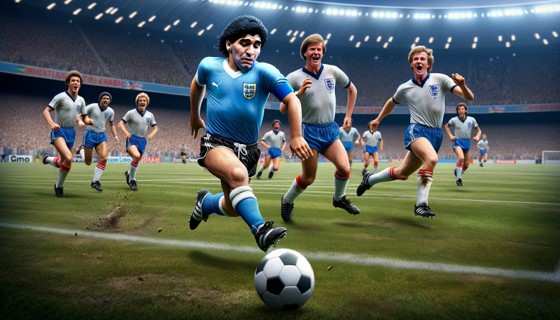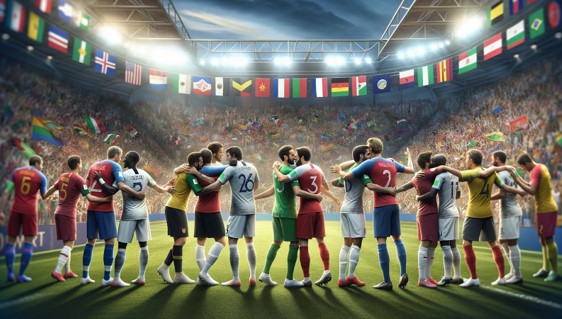 The history of the World Cup is a fascinating journey through time, marked by iconic moments, technical and cultural evolution. Since its inception in 1930, the tournament has transformed from a modest gathering of soccer-loving nations to a global spectacle, watched and celebrated by millions of fans around the world.
The history of the World Cup is a fascinating journey through time, marked by iconic moments, technical and cultural evolution. Since its inception in 1930, the tournament has transformed from a modest gathering of soccer-loving nations to a global spectacle, watched and celebrated by millions of fans around the world.
The beginning: the first World Cup
The first edition of the World Cup, held in Uruguay in 1930, was a celebration of the centenary of Uruguayan independence. With 13 teams taking part, the event signalled the start of a new era in international soccer. In this context of celebration and competition, platforms like 1win offer fans the opportunity to get even more involved with the game through sports betting.
Expansion and change
Since its early days, the World Cup has experienced several significant changes:
- Increase in the number of teams: from 13 initial teams to 32 in the current edition, increasing global representativeness.
- Introduction of television: television broadcasting began in the 1950s, expanding the reach and popularity of the tournament.
- Technology in football: the use of VAR (Video Assistant Referee) in Russia 2018 exemplifies the integration of technology to ensure the fairness of matches.
Unforgettable moments
 The World Cup is rich in stories that have captivated fans all over the world. Some of the most memorable moments include:
The World Cup is rich in stories that have captivated fans all over the world. Some of the most memorable moments include:
- The Maracanazo (1950): Uruguay beating Brazil at home, one of the biggest upsets in soccer history.
- The Hand of God (1986): Diego Maradona’s handball against England, followed by the “Goal of the Century”, with the same player dribbling past half the opposing team.
- The Ronaldo phenomenon (2002): Ronaldo’s redemption, leading Brazil to its fifth world title after a devastating injury in 1998.
Tactical evolution
The soccer seen in the early World Cup tournaments differs drastically from the modern game, with both tactical and technical evolutions:
- From the WM formation to ball possession tactics: strategies have evolved from rigid formations to more fluid, possession-based styles of play.
- Fitness and nutrition: the importance of fitness and nutrition for player performance has become central, with teams investing in sports science.
Cultural and social impact
Beyond the sporting spectacle, the World Cup has a profound cultural and social impact, uniting nations and transcending differences:
- Celebration of diversity: the tournament is a stage for celebrating cultural diversity, bringing together people from different countries and traditions.
- Inspiration for generations: players like Pelé, Maradona, Messi and Cristiano Ronaldo have inspired millions of young people to pursue their dreams in soccer.
The future of the World Cup
Looking to the future, FIFA plans to expand the tournament to 48 teams from 2026, seeking to include even more nations and give more players the chance to shine on the world stage. With technological advances, the tournament also promises to bring innovations that will improve the playing and spectating experience.
Challenges and opportunities
Expansion brings its challenges, such as ensuring infrastructure and maintaining the quality of the tournament. However, it also opens up opportunities for smaller nations to shine and for soccer to continue to unite the world in innovative and exciting ways.
Economic and commercial impact
In addition to its enormous cultural and social impact, the World Cup is also an economic and commercial giant. The tournament attracts massive investment in advertising, tourism and infrastructure, boosting the economies of the host countries and generating business opportunities.
Investment in infrastructure
World Cup host countries often invest in infrastructure, including state-of-the-art stadiums, public transportation and hotel improvements. These investments not only improve the spectators’ experience during the tournament, but also leave a lasting legacy for local communities.
 Business opportunities
Business opportunities
The World Cup is a showcase for global brands seeking to associate themselves with the prestige and excitement of the event. Companies take the opportunity to launch creative advertising campaigns and reach global audiences, increasing their visibility and boosting sales of football-related products.
Conclusion
The World Cup has evolved from a simple tournament into a global phenomenon that captivates hearts and minds around the world. Its legacy is built on unforgettable moments, technical and tactical evolutions, and its immense cultural and social impact. As we look to the future, the tournament promises to continue its tradition of excellence and unity through the beautiful game.




